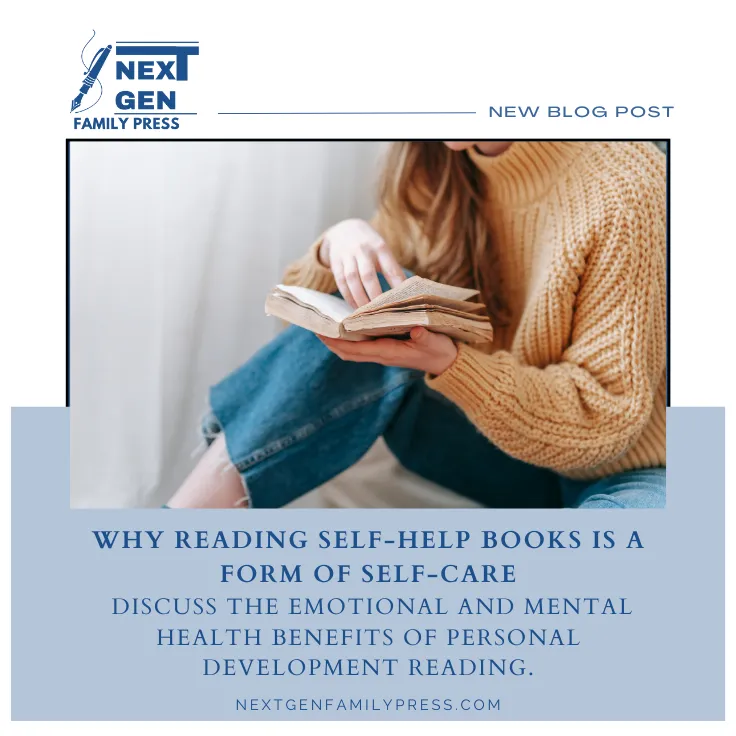
Why Reading Self-Help Books Is a Form of Self-Care
How Personal Development Reading Nurtures Mental Health, Especially for Caregivers
In the quiet moments between responsibilities, when the world seems to demand more than you feel you have to give, opening a book may seem like a luxury. But for caregivers—those who pour so much of themselves into others—reading a self-help book isn’t indulgence. It’s a lifeline. A necessary, restorative act of self-care.
This post explores the emotional and mental health benefits of personal development reading, and why it matters deeply for those who spend their days caring for others.
1. A Gentle Mirror: Reading Helps You Recognize Yourself Again
When you’re in a caregiver role—whether for a loved one, a patient, or a community—it’s easy to forget that you matter, too. Self-help books often speak directly to your inner world. They validate what you’re feeling, reflect your unspoken challenges, and remind you that you're not alone.
“You cannot pour from an empty cup. Take care of yourself first.”
— Unknown
This quote isn’t just a cliché—it’s a principle. Reading a chapter on boundaries, burnout, or emotional fatigue can offer the kind of understanding that even friends and family might not be able to provide.
2. A Safe Place to Feel and Heal
Unlike hurried conversations or rushed appointments, reading gives you space. You’re allowed to slow down. To cry, breathe, highlight, and pause. In those private, uninterrupted moments, a book becomes a safe space for reflection and emotional release.
Books like Burnout by Emily and Amelia Nagoski or Radical Acceptance by Tara Brach invite you to confront your stress with compassion rather than judgment.
“When we give ourselves compassion, we are opening our hearts in a way that can transform our lives.”
— Kristin Neff
Caregivers often carry invisible weight. Reading helps you set some of it down—even if just for a few pages.
3. A Roadmap Back to Balance
Self-help books aren’t only about insight—they’re also about instruction. Many provide step-by-step tools, frameworks, or simple practices to help you reconnect with yourself. Whether it's five minutes of deep breathing, reframing negative thoughts, or learning to say no gracefully, these are tools you can put into practice immediately.
“Small hinges swing big doors.”
— W. Clement Stone
As a caregiver, even small shifts in your thinking can create noticeable changes in how you cope and how you feel.
4. A Source of Empowerment and Identity
Caregiving, while deeply meaningful, can blur the lines between who you are and what you do. Personal development reading helps rebuild your sense of self outside of service to others. It affirms that your needs, dreams, and boundaries are not just valid—they're vital.
“You are allowed to be both a masterpiece and a work in progress, simultaneously.”
— Sophia Bush
Through reading, you can begin to reclaim your voice, your values, and your vision for life—even if you’re navigating exhaustion, grief, or compassion fatigue.
5. A Private, Accessible Act of Self-Care
Not all self-care looks like a spa day or vacation. Sometimes, it’s ten quiet minutes in the morning, a dog-eared chapter by your bedside, or an audiobook in the car between errands. Reading is affordable, accessible, and deeply personal—making it ideal for caregivers with unpredictable schedules.
It doesn’t require permission, planning, or performance. It just requires presence.
“Reading is essential for those who seek to rise above the ordinary.”
— Jim Rohn
For caregivers, reading isn’t escapism—it’s nourishment. It reaffirms your right to grow, even while you're giving.
Reading Is a Gentle Act of Reclamation
Self-help books won’t solve every problem. But they will remind you of your worth, offer you perspective, and give you tools to cope, care, and continue. In the sacred, stolen moments between tasks and tending, a book can hold space for you—until you’re ready to hold it for yourself again.
So, if you’re a caregiver wondering whether reading self-help is “worth the time,” the answer is yes. Not because it makes you better for others—but because it brings you back to you.